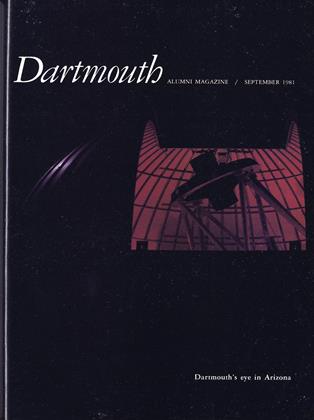DAVID GARRICK: A Critical Biography by G. Winchester Stone Jr. '30 and George M. Kahl Southern Illinois, 1979. 771 pp. $60
March 2 is marked with a red letter in the literary calendar, for on that day in 1737 a schoolmaster from the Staffordshire town of Lichfield set out to try his luck in London. Samuel Johnson found no fortune, apart from the fame which grew slowly in his lifetime and rapidly after it. But his companion on the journey, his pupil David Garrick, who was supposed to become a lawyer and who was for a while a wine merchant, became swiftly famous as the greatest actor and theatrical manager of his day. Thus the teacher and the pupil (who was 20 in 1737) to some extent changed roles. While Johnson lived out his own dictum, "Slow rises worth by poverty oppressed," Garrick's talent shot him to the top of his profession and kept him there, effectively unchallenged and lionized, for 40 years.
Garrick's enormous talent and its immediate reward produced something of a counter-reaction in the artistic circles in which he moved. Quite clearly, Johnson loved him with the baffled complexity of a father who feels imperiled by the independence and difference of a successful son. He would let no one else denigrate Garrick (as Boswell discovered in that first conversation in Davies' bookshop) and did little else but denigrate him himself. And since Johnson was the literary gent (with a Boswell to record his comments), that denigration is remembered. Poets make history. So Goldsmith's paradox about Garrick in "Retaliation" clings in the memory: "On the stage he was natural, simple, affecting;/'Twas only that when he was off he was acting." And. Joshua Reynolds wrote a prose portrait of Garrick (to go along with his seven portraits of him in paint) that argues essentially the same case.
In this gigantic biography, George Winchester Stone and George M. Kahrl do not prostrate themselves before these literary judgments. Their Garrick is the great actor and manager, patron of the arts, versifier and playwright of real talent, collector and preserver of the old English drama, but also a chevalier sans reproche,
"the embodiment of the best in an eighteenth-century gentleman, socially, morally, and personally." And they convince. Stone catalogued the huge Garrick collection in the Folger Library and edited the volume of The English Stage covering Garrick's career. Kahrl edited Garrick's equally huge correspondence. They know Garrick as well as he can be known, and this biography, "Garrick 14" as they call it (since it is the 14th life of the actor), can be called definitive if ever a book could. For the visible future, all roads to Garrick will run through Stone and Kahrl.
But to be definitive is not necessarily to be graceful, and this biography is more likely to be enjoyed in occasional consultations than when traversed. It is, in effect, a great encyclopedia of the life, work, and times of David Garrick, and like an encyclopedia it is not for consecutive reading. The authors call it an "analytical rather than a chronological biography," and its encyclopedic nature is compounded by the dual authorship. Stone and Kahrl have divided Garrick not chronologically but topically, Stone taking Garrick the professional man and Kahrl the private figure. Inevitable overlappings cause considerable repetition, therefore, and the separate hands write different styles, Stone's being notably better.
As an encylcopedia, though, the book is highly successful, full of treasures. There is, for instance, a splendid essay on the theories of acting that Garrick both followed and modified and many fascinating accounts of him on stage. The authors show that his championship of Shakespeare meant that his productions consistently moved towards restoration of Shakespeare's own text to the stage to replace the "improvements" universally accepted in the 18th century, though even Garrick would not have the Fool in Lear or the Gravediggers in Hamlet. There are 55 full-page illustrations, chiefly of the "most be-pictured man in the eighteenth century," both on stage and in his own person. There are a hundred pages of appendices, references, and notes, and the whole thing is a monument to Garrick and to American literary scholarship in the 20th century. Some years ago, Ronald Paulson produced a comparable encyclopedia of Hogarth but then allowed a concise and readable biography to be quarried out of it. Could not the same be done for Garrick? Then we could have our monument and read it, too.
David Garrick's countryman David Wykesis associate professor of English.
 View Full Issue
View Full Issue
More From This Issue
-
 Feature
FeatureThe big eye in Arizona
September 1981 By Shelby Grantham -
 Cover Story
Cover StoryInauguration of the 14th President: The Spirit of Eleazar Wheelock ... Transmitted through his Successors'
September 1981 -
 Feature
FeatureAll the Presidents's People
September 1981 By J. N. -
 Class Notes
Class Notes1956
September 1981 By Clement B. Malin -
 Article
ArticleHistory Without Battles
September 1981 By Beth Ann Baron '80 -
 Class Notes
Class Notes1950
September 1981 By Jacques Harlow
David Wykes
Books
-
 Books
BooksTHE CANYON
November 1940 By Charles Bolte '41 -
 Books
BooksECONOMIC PRINCIPLES IN PRACTICE
June 1939 By G. W. Woodworth -
 Books
BooksTHE WHITE STRANGER
May 1940 By Kenneth A. Robinson -
 Books
BooksTHE FEAR OF CONSPIRACY: IMAGES OF UN-AMERICAN SUBVERSION FROM THE REVOLUTION TO THE PRESENT.
OCTOBER 1971 By PETER SLATER -
 Books
BooksA Philosophical Poet, Full Of Wonder
April 1977 By PHILIP BOOTH '47 -
 Books
BooksTHE MISSISQUOI LOYALISTS
October 1938 By W. R. Waterman





